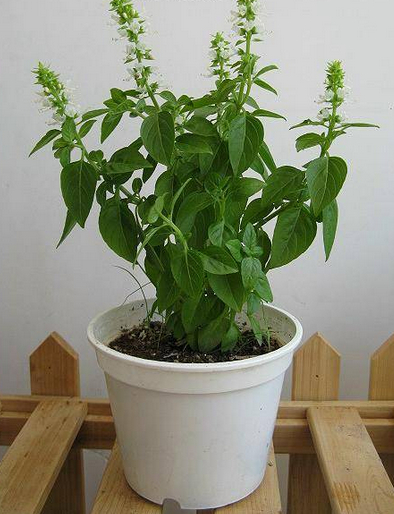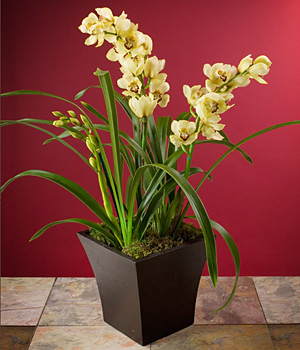Prevention and control of diseases and insect pests of basil
Pest control
In terms of insect pests, there are mainly aphids, Japanese beetles, thrips, leaf miners, snails and slugs. Organic cultivation can be used to spray away aphids and to catch Japanese beetles by hand and throw them into soapy water. Slugs and snails can be trapped in small beer containers or tied to copper at 5 cm (10 cm) from the base of the plant, which retreats due to the interaction between copper and slug mucus.
In terms of diseases, sweet basil varieties were highly infected with fungal wilt (fusarium oxysporum). The pathogen invades from the microtubule bundle of the root, hinders the growth of the plant and leads to leaf withering. Pathogens can lie dormant in the soil for many years. Fungus-resistant F1 hybrids, such as nufar, can be selected in field cultivation, while ocimum americanum and clove basil are resistant to fungal wilt. In addition, high humidity and poor drainage are also more likely to be infected with fungal leaf spots.
Basil mixed with asparagus, pepper, tomatoes and most vegetables can increase the growth and flavor of these crops, but not with cabbage and beans. In addition, stay away from Rutaceae. Because of its special taste, it can block whitefly and diamondback moth larvae. Slugs don't like basil either. In organic cultivation in Taiwan, basil is also used as a repellent crop to reduce insect pests.

Vanilla contains a special smell, which has a repellent effect on some pests, but some pests still eat leaves, such as basil. Some varieties of basil will have night bugs. At this time, they would rather use dim sum to catch them by hand. or use an anti-insect net to cover and isolate. Disease prevention is better than cure, the way is not to use the cultivated old soil to grow vanilla, because the hidden pathogens will become the source of infection, in addition, vanilla is cultivated in the right environment or season, so that the plant is strong and naturally resistant to the disease. Remember that fresh vanilla is eaten raw or heated for a short time. If it contains pesticides, it will have adverse effects on your health. Or use diluted detergent.
Pest control of clove basil
1. Yellow ants bite seeds or buds, resulting in sparse emergence or lack of seedlings. Control method: spray with 1000 times of 90% trichlorfon or 1000 times of 80% dichlorvos.
two。 Aphids harm the twigs and young leaves of clove basil. Prevention and treatment: spray 25% imidophos 1000 times solution. Do not spray dimethoate, otherwise it is easy to cause early defoliation.
3. The beetle harms the twigs and young leaves of clove basil. Prevention and treatment: spray 25% imidophos 1000 times solution.
Diseases and insect pests of basil and its control
Diseases of basil and its control
Basil suffers from diseases such as fungal wilt. When basil outbreaks fungal wilt, the pathogen invades from basil's vascular bundles, causing basil's plants to grow poorly and leaves to wither and wither. These pathogens can usually lie dormant in the soil for many years, and the prevention of diseases requires frequent soil change, or soil disinfection and sterilization to reduce the chances of disease outbreaks. In addition, if basil grows in an environment where air humidity is too high, poor ventilation, or poor soil drainage, it will also make germs and bacteria breed, appear a variety of diseases, and affect growth.
At ordinary times, we should pay attention to more ventilation to ensure that the soil does not accumulate water and minimize the chance of basil diseases. Don't use pesticides regularly. Basil is an edible and medicinal plant, there will be certain pesticide residues, will be harmful to the human body, the use of biological control or safe green control methods as far as possible.
Insect pests of basil and its control
In fact, basil is not suitable for the outbreak of insect pests, because basil itself has a special smell, which will drive some pests away from basil and avoid basil damage. However, basil can not avoid the harm of some pests.
Basil is sometimes harmed by pests such as aphids, burglars, thrips, Japanese beetles, snails, leaf miners and slugs. These pests will have more or less adverse effects on the growth of basil plants.
When these pests break out in basil, artificial or safe self-made pesticides are used to kill the pests. For example, install some insect-proof nets and use various materials to trap and kill pests. Reduce the use of pesticides and avoid pesticide pollution.
- Prev

Control of Diseases and insect pests of Cymbidium
Fungal anthracnose mostly occurs at the top of the leaf, the edge of the spot is dark brown, the middle is gray, mostly caused by high temperature, high humidity, poor ventilation, the spot should be cut off in time, and cooperate with spraying. Common medicament has 1000 times mancozeb and 1000 times mancozeb.
- Next

How to treat jasmine without blooming
Jasmine leaves are green all the year round, from early summer to late autumn, the flower fragrance continues for several months, the anthocyanin is pure and white, and the charm is charming. However, some jasmine has luxuriant branches and leaves, but few flowers; some do not even bloom. Now the main causes are diagnosed and treated for reference.
Related
- Fuxing push coffee new agricultural production and marketing class: lack of small-scale processing plants
- Jujube rice field leisure farm deep ploughing Yilan for five years to create a space for organic food and play
- Nongyu Farm-A trial of organic papaya for brave women with advanced technology
- Four points for attention in the prevention and control of diseases and insect pests of edible fungi
- How to add nutrient solution to Edible Fungi
- Is there any good way to control edible fungus mites?
- Open Inoculation Technology of Edible Fungi
- Is there any clever way to use fertilizer for edible fungus in winter?
- What agents are used to kill the pathogens of edible fungi in the mushroom shed?
- Rapid drying of Edible Fungi

